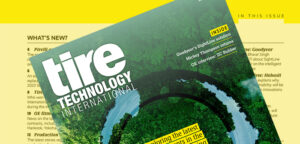TTI caught up with Bekaert at this year’s Tire Technology Expo to discuss the company’s new standard to improve steel cord sustainability
At Tire Technology Expo 2024, Bekaert introduced what it describes as a significant leap forward in the steel industry’s commitment to sustainability – the Recycled Content Standard. The company says the new standard provides a comprehensive framework that sets rigorous criteria for recycled content claims in steel wire products.
A key differentiator is the standard’s emphasis on controlled blending and physical segregation of materials, as opposed to relying solely on mass balance approaches. The company states that this method ensures a high level of traceability and integrity in the recycled content, clearing the path for transparent recycled content communication and reducing ambiguities related to the presence of scrap in the product.
“Bekaert recognized an industry-wide need for clear, unified standards regarding the inclusion of recycled content in wire products, primarily due to the absence of international benchmarks in this space,” said Heiko Isselee, line owner for steel cord and innovation platform manager for recycled steel.
“This initiative is about setting a transparent and certifiable framework that organizations can apply to guarantee their products meet a certain threshold of recycled content, and that this recycled content is physically present in the material. It aims to fill a critical gap in the market, setting strong requirements for those companies that want to validate their circularity claims.”
“By adopting the Bekaert standard, manufacturers ensure their products contain a guaranteed amount of physical recycled content. This clarity offers peace of mind to customers, reinforcing the validity of sustainability claims made by companies”
Heiko Isselee, line owner for steel cord and innovation platform manager for recycled steel, Bekaert
Open to all
The new standard is publicly available, making it accessible to any organization within the wire products industry interested in certifying their claims for the use of recycled materials. It contains definitions of scrap content, applicable chains of custody and formulas for the calculation of recycled content. This standard also serves as a competitive advantage in the market, strengthening the reputation of organizations because it reassures customers and partners about the authenticity of the recycled content within their products.
According to Isselee, the push for recycled content is being driven by an increasing global emphasis on sustainability and the circular economy. “As consumers, regulatory bodies and industry stakeholders demand more environmentally friendly products, transparent and reliable documenting of the circularity of materials has become crucial,” he explained.
“Increasing the recycled content in products reduces the need to extract new resources from the planet. By adopting the Bekaert standard, manufacturers ensure their products contain a guaranteed amount of physical recycled content. This clarity offers peace of mind to customers, reinforcing the validity of sustainability claims made by companies.
“It’s expected that this standard will set a new benchmark in the industry, encouraging more organizations, and possibly also other industries, to follow suit and contribute to the shift toward more sustainable steelmaking technologies in the entire world.”
Isselee said the standard attracted a lot of support and appreciation at the expo from suppliers and customers within the industry, indicating a widespread willingness to establish a common language on circularity in steel wire products.
“We hope the standard will be endorsed by many stakeholders in the industry, becoming the effective standard for recycled-content claims. By doing so, we can collectively move toward a more sustainable and responsible steel industry, establishing a new benchmark for environmental stewardship,” he said.
Lead by example
Bekaert is a leading manufacturer of products with a high level of recycled content, including steel cord and bead wire with 50% and 70% recycled content, respectively. These offerings are supported by third-party certification against the Bekaert standard, ensuring that wire rod suppliers and Bekaert plants meet stringent requirements for recycled content.
“The decision for Bekaert to offer products with 50% and 70% recycled content was strategically made to balance sustainability goals with practical supply-and-demand considerations,” noted Isselee. “These levels were determined to be achievable and sustainable within the current market context, providing a solid foundation for future adjustments based on technological advances and shifts in supply chain capabilities.”
This article originally appeared in the March 2024 Issue of Tire Technology International. To view the magazine in full, click here.



